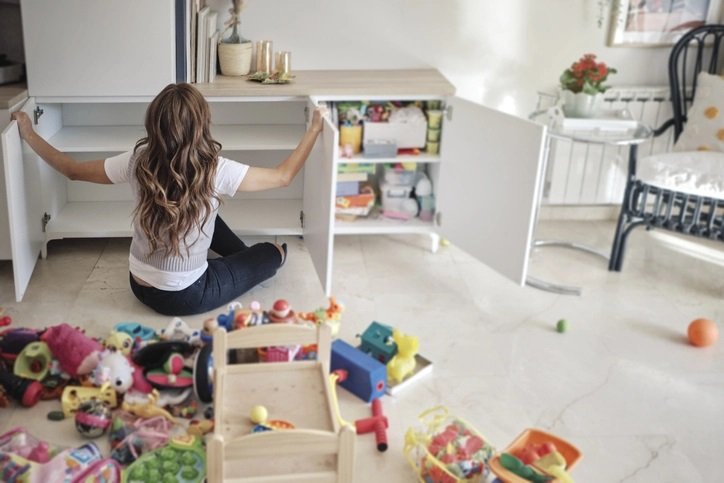The Hidden Impact of Clutter & How to Reclaim Your Space!
In today's fast-paced world, where time is as sparse as a moment of silence in a bustling household, maintaining an organized home can often take a backseat. This blog post aims to uncover the not-so-visible effects of clutter on our well-being. It's easy to dismiss a cluttered space as merely an eyesore or a minor inconvenience. However, the truth is, the ramifications extend far deeper, affecting our nervous and immune systems, hormones, and even our mental health.
The Physical Repercussions
At first glance, the link between clutter and physical health may seem tenuous. However, scientific studies have unveiled a fascinating and somewhat alarming connection. Clutter acts as a significant source of stress, signaling to our brains that our tasks are endlessly incomplete, which elevates our cortisol levels. This constant stress keeps us in a perpetual state of fight-or-flight, overburdening our nervous system and, by extension, weakening our immune system. Thus, living in disarray can compromise our immune response, leaving us more vulnerable to illnesses—an outcome most mothers would agree is untenable. Additionally, clutter can also have a detrimental effect on the quality of our sleep! A study published in the journal "Sleep" found that people who slept in cluttered spaces experienced more sleep disruptions and took longer to fall asleep than those with tidy homes.
Clutter and Hormonal Imbalance
The link between clutter and hormonal imbalance is an area of growing interest. High levels of stress, triggered by clutter, lead to an overproduction of cortisol. This imbalance can wreak havoc on other hormones, including thyroid hormones and sexual hormones, leading to a myriad of health issues, such as fatigue, weight gain, and even disrupted menstrual cycles. For women juggling the demands of career and home, the additional burden of hormonal imbalance due to environmental factors such as clutter is an unwelcome guest.
A Drain on Mental Health
The impact of clutter reaches beyond the mere physical, profoundly influencing our mental and emotional well-being. A cluttered space mirrors a cluttered mind, hindering focus, decision-making, and the pursuit of tranquility. The constant presence of disarray triggers feelings of overwhelm, anxiety, and guilt, perpetuating a harmful cycle of stress and inefficiency. Notably, clutter is often associated with depression, low self-esteem, and poor personal boundaries, indicating that external disorder can amplify and reflect inner turmoil, leading to mental stagnation. Research indicates that disorganized environments strain our brain's ability to concentrate, posing additional challenges for individuals with ADHD (attention deficit hyperactivity disorder). For those managing ADHD, engaging a professional organizer or coach could be a pivotal step towards reclaiming order and peace in their lives. From a messy desk and cluttered closet to a chaotic living space, clutter profoundly affects our physical, mental, and emotional health, making it difficult to focus, stay productive, and feel satisfied with our environments.
Engaging Stories: The Emotional Cost of Clutter
Reflecting on my own experiences, witnessing the emotional toll clutter took on my mother was incredibly difficult. It wasn't just the physical clutter; it cluttered her mind, clouding her judgment and dampening her spirit. The constant, subtle reminder that another task awaited her attention was exhausting. I realized the extent of this when her clutter began to mirror her internal state—overwhelmed, chaotic, and in desperate need of clarity. That's when I truly understood the undeniable link between our environment and our emotional well-being. Tackling the clutter became not just a chore but a crucial step towards her mental and emotional freedom.
The Path to Healing
Recognizing the detrimental effects of clutter on our mental and physical well-being is the first critical step towards addressing them. For women who are especially feeling the burden of clutter in their lives, the journey to healing and reclaiming their space begins with small, manageable steps. The process of decluttering your space, and by extension, decluttering your life, can significantly contribute to improved mental health and a sense of well-being.
The initial step involves starting by identifying the areas in your home or workspace that cause the most stress or discomfort. This could be a cluttered desk, an overflowing closet, or even just a messy kitchen. Once these key areas have been identified, the task is to work through them systematically, one by one, without rushing or overwhelming yourself.
It's crucial to approach decluttering with patience, recognizing that the aim extends beyond merely achieving a tidy space. More importantly, it's about fostering a serene and tranquil mental environment. By clearing our physical surroundings, we pave the way for a more calming and nurturing setting for ourselves. This shift can enhance focus, boost productivity, and nourish a sense of peace and satisfaction in our everyday lives. Additionally, it's vital to examine any deep-seated beliefs attached to certain items. Asking ourselves why we struggle to part with an object—whether it's a keepsake from a parent who has passed or a gift from a friend—can illuminate the underlying reasons that hinder our progress towards a clutter-free environment. Understanding these emotional blocks is a crucial step in our journey towards creating a more organized and peaceful space.
Remember, decluttering is not a one-time activity but a continuous process of choosing what to keep in your life and what to let go of. Each item you decide to part with is a step towards a less cluttered, more harmonious living space that supports your well-being and life goals.
In Conclusion
The effects of clutter extend far beyond an untidy home. They infiltrate every facet of our well-being, from our physical health to our emotional and mental state. For women and moms, who often take on the majority of domestic management, the impact is significantly amplified. Acknowledging this hidden stressor offers us an opportunity for change. It's time we give ourselves permission to prioritize our well-being by creating spaces that nourish rather than deplete us. After all, a clear space fosters a clear mind, paving the way for a healthier, happier life.




